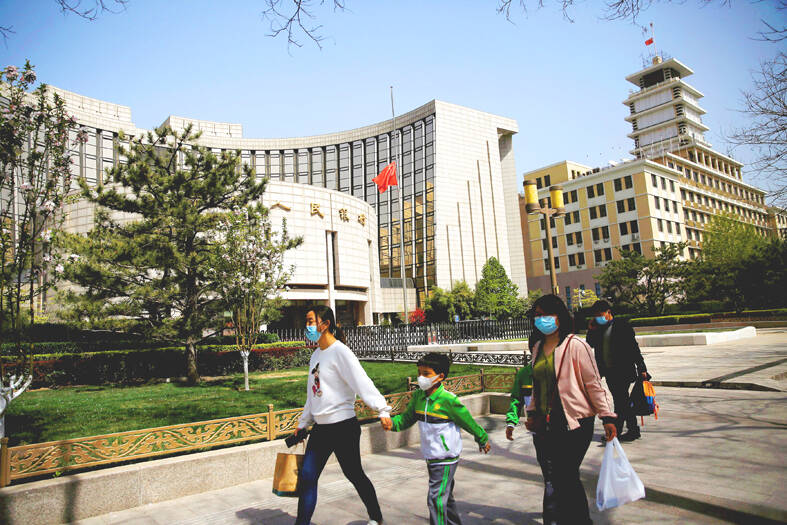People’s Bank of China (PBOC) Governor Yi Gang (易綱) said the central bank’s attention is to be centered on economic growth, a sign policymakers might shift gear toward supporting economic recovery as the nation gradually eases COVID-19 controls.
“Our focus is growth right now,” Yi said yesterday in a video speech given to a central bank conference in Bangkok. “We have a pretty accommodative monetary policy in place to help with economic recovery and [to] maximize employment.”
The growth rate is currently “somewhat slower than expected due to COVID and other factors,” Yi said, adding that inflation has been relatively subdued, and it would likely remain in a “moderate range” next year.

Photo: REUTERS
The central bank recently surprised market watchers by cutting the reserve requirement ratio for banks — unleashing more cash that banks can use for lending.
Economists expect the central bank to keep monetary policy relatively loose into early next year.
Speculation is also growing the Chinese Communist Party’s politburo, its top decision-making body, would likely signal a more pragmatic approach toward COVID-19 controls during its meeting this month, while placing greater focus on boosting growth.
Yi’s comments “confirmed the recent shift of policy focus to growth after the party congress” in October, Mizuho Bank foreign exchange strategist Ken Cheung (張建泰) said.
“In addition to the COVID policy, the reform in the property market has yielded progress and the PBOC is set to maintain its easing bias to support the property sector and boost growth after COVID hit,” he said.
Chinese stocks traded 0.4 percent lower yesterday after gaining in the previous three sessions.
The relaxation of some COVID-19 curbs and a shift in the official rhetoric around “zero COVID” has fueled hopes that the country might be preparing to reopen next year.
However, the economic recovery would remain bumpy, with growth likely to come in below 5 percent next year, economists surveyed by Bloomberg said.
The economy is forecast to expand 3.3 percent this year, which would be the second-slowest pace since the 1970s after 2020.
Aside from quantitative monetary policy tools, the central bank is also making use of structural instruments to boost its support to small businesses, the agriculture sector and private firms, Yi said.
The governor’s comments were part of a panel with other central bankers hosted by the Bank of Thailand and the Bank for International Settlements.
European Central Bank President Christine Lagarde, Reserve Bank of Australia Governor Philip Lowe and Bank Indonesia Governor Perry Warjiyo attended the event.
Yi called for stronger collaboration between advanced and emerging economies on macroeconomic policies, as indicators point to a rising possibility of a global recession next year.
Many emerging markets and low-income countries are facing pressures from depreciating currencies, capital outflows and inflation, he said.

Vincent Wei led fellow Singaporean farmers around an empty Malaysian plot, laying out plans for a greenhouse and rows of leafy vegetables. What he pitched was not just space for crops, but a lifeline for growers struggling to make ends meet in a city-state with high prices and little vacant land. The future agriculture hub is part of a joint special economic zone launched last year by the two neighbors, expected to cost US$123 million and produce 10,000 tonnes of fresh produce annually. It is attracting Singaporean farmers with promises of cheaper land, labor and energy just over the border.

US actor Matthew McConaughey has filed recordings of his image and voice with US patent authorities to protect them from unauthorized usage by artificial intelligence (AI) platforms, a representative said earlier this week. Several video clips and audio recordings were registered by the commercial arm of the Just Keep Livin’ Foundation, a non-profit created by the Oscar-winning actor and his wife, Camila, according to the US Patent and Trademark Office database. Many artists are increasingly concerned about the uncontrolled use of their image via generative AI since the rollout of ChatGPT and other AI-powered tools. Several US states have adopted

KEEPING UP: The acquisition of a cleanroom in Taiwan would enable Micron to increase production in a market where demand continues to outpace supply, a Micron official said Micron Technology Inc has signed a letter of intent to buy a fabrication site in Taiwan from Powerchip Semiconductor Manufacturing Corp (力積電) for US$1.8 billion to expand its production of memory chips. Micron would take control of the P5 site in Miaoli County’s Tongluo Township (銅鑼) and plans to ramp up DRAM production in phases after the transaction closes in the second quarter, the company said in a statement on Saturday. The acquisition includes an existing 12 inch fab cleanroom of 27,871m2 and would further position Micron to address growing global demand for memory solutions, the company said. Micron expects the transaction to

A proposed billionaires’ tax in California has ignited a political uproar in Silicon Valley, with tech titans threatening to leave the state while California Governor Gavin Newsom of the Democratic Party maneuvers to defeat a levy that he fears would lead to an exodus of wealth. A technology mecca, California has more billionaires than any other US state — a few hundred, by some estimates. About half its personal income tax revenue, a financial backbone in the nearly US$350 billion budget, comes from the top 1 percent of earners. A large healthcare union is attempting to place a proposal before